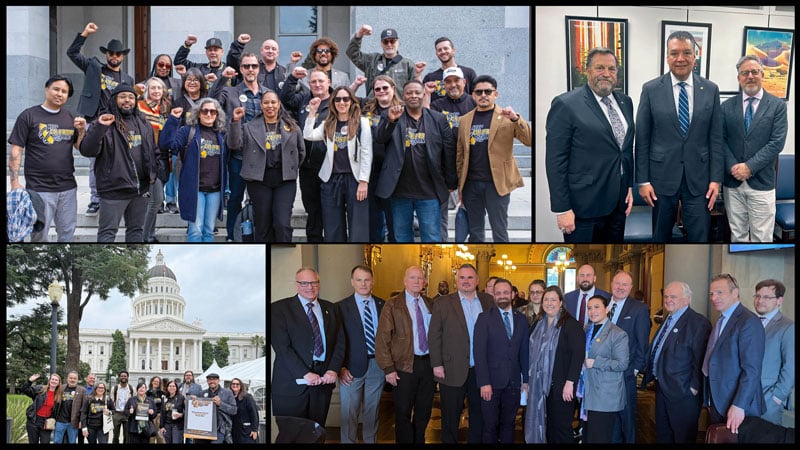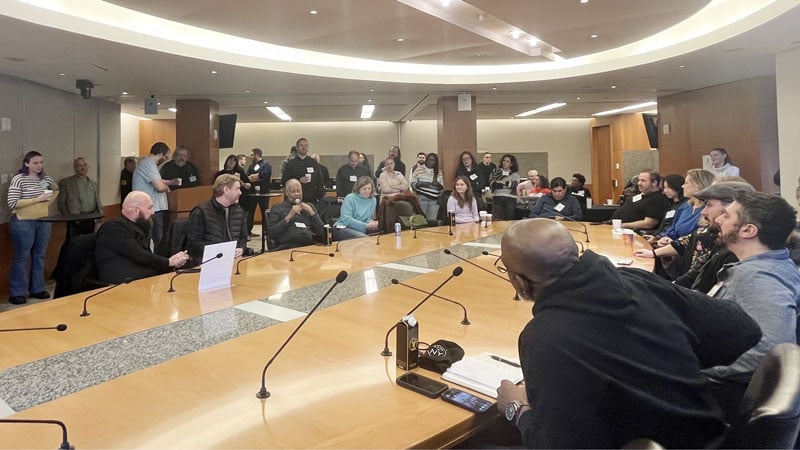The DGA understands that many of our members are concerned about the dramatic reduction in film and television production across the industry. The news stories about potential federal film tariffs have created additional anxiety throughout the industry. We wanted to update you on where the federal and state conversations stand.
Global Production Update
First, we want to offer some perspective about where we see the industry. We are experiencing the most significant global reduction in film and television production in a lifetime. The studios and streamers have pulled back on content spending, reducing both the number of films and television programs they produce and the amount they are spending on those programs they continue to produce. This global contraction has resulted in a 9% reduction in feature film production from 2022 to 2024, and a 32% reduction in episodic television production for the same period. Production is down in every major production center, domestically and internationally. As the number of film and television programs being produced decreases, those projects leaving the United States to chase foreign production incentives become even more significant.
Our goal is to level the playing field so that the decision where a film and television production is shot is based solely on the creative decisions. This will require action at local, state and federal levels in the form of tax incentives and other reforms like friendlier permitting that make shooting easier and more financially attractive. The DGA is laser focused on all levels to make sure these incentive programs are designed to maximize job creation and job protection efforts.
Federal Efforts
The DGA sees a federal tax incentive as an integral part of our efforts to make the U.S. film and television industry more competitive globally. We welcome this new conversation in Washington, DC about creating that level playing field.
Even before the Voight proposal was released, DGA National Executive Director Russell Hollander and Director of Government Affairs Mike Stoever were in Washington, DC, meeting with policymakers and our lobbyists about how to drive a greater coordinated effort in Congress to pass a comprehensive film and television tax incentive.
We began work on a comprehensive set of federal incentives – some which can be accomplished immediately in the ongoing reconciliation effort or through executive order and others that take longer as they require Congressional action.
One of the most important components is a true federal incentive that will spur American jobs and economic development and be stackable with incentives currently in place at the state level, helping to combat the flow of production heading overseas.
We have also advocated for the reauthorization of the nation’s existing 20-year-old federal tax deduction for domestic production, known as Section 181, which is a broad-based policy solution that represents an important step in helping to keep jobs in America. We are also advocating for Congress to adopt a domestic manufacturing and production incentive to encourage more domestic employment, including in film and television productions produced within the U.S. and made by American workers.
Finally, we have met multiple times with Jon Voight and his team on their proposal and recently co-authored a letter of support signed by the industry urging action. We will continue to work with the administration to help develop and pass a meaningful federal package that will create more jobs for our members.
California Efforts
Western Executive Director Rebecca Rhine has been deeply involved in a coordinated labor-led effort to increase the state’s tax incentive program from $330 million to $750 million, which we believe will restore 400,000 to 500,000 additional working days, while also helping to retain the work that is already covered by the program in the State. This Entertainment Union Coalition effort, called “Keep California Rolling,” is focused on ensuring that any increase in funding for or changes to the incentive program was all about developing a more competitive program that prioritized jobs, not studio profits. This legislation has already received overwhelming support from key committees in Sacramento over the last few weeks and now moves to the full legislature and the governor for their action on the budget and the programmatic changes. We are proud to be part of an initiative that recognizes that when our industry thrives, California thrives.
New York Efforts
In New York, Eastern Executive Director Neil Dudich and our partners in the New York Film & Television Union Coalition were instrumental in advocating for substantial improvements to the state’s Film & Television Incentive. New York just recently passed a budget that includes an expansion of the expenses eligible for the credit, much quicker realization of the tax credit for producers, a two-year extension of the funding allocation, and a new $100 million fund dedicated to the cultivation of independent film. These changes and others will immediately and significantly improve the competitiveness of New York’s incentive and help lure more production, jobs and economic activity to New York.




































